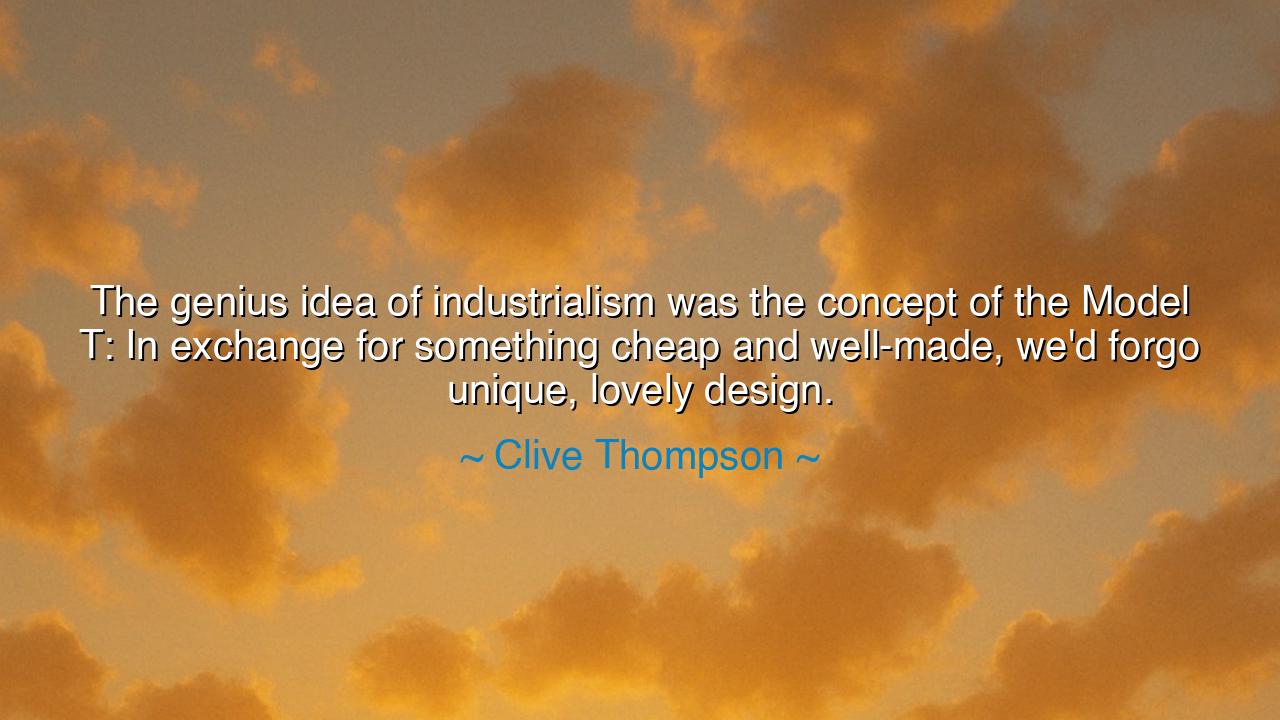
The genius idea of industrialism was the concept of the Model T:
The genius idea of industrialism was the concept of the Model T: In exchange for something cheap and well-made, we'd forgo unique, lovely design.






In the discerning words of Clive Thompson, the reflection — “The genius idea of industrialism was the concept of the Model T: In exchange for something cheap and well-made, we'd forgo unique, lovely design.” — captures a pivotal moment in the story of civilization. It is a meditation on the trade we made as a species when we embraced industrial progress: the surrender of individuality for accessibility, of artistry for efficiency. His words are not a condemnation, but a revelation — a recognition that every age of innovation carries both gift and sacrifice. What Henry Ford’s Model T brought forth was not merely a machine, but a new philosophy — one that reshaped the world, altered the rhythm of human labor, and forever changed our understanding of beauty and worth.
The meaning of this quote lies in the paradox of modern convenience: that in our pursuit of equality through production, we often abandon the soulful uniqueness that once defined the human hand. Before the dawn of industrialism, every object bore the mark of its maker — a table carved with care, a shoe shaped by the cobbler’s wisdom, a chair whose imperfections were its charm. Yet, when the assembly line arrived, humanity discovered the power of repetition. The world’s wonders could now be replicated by the thousands, and what was once the privilege of the few became the property of the many. It was a triumph of utility — but it came with a quiet mourning for the artistry of the individual.
The origin of Thompson’s thought reaches back to the early 20th century, when Henry Ford unveiled the Model T, the car that transformed not only transportation but the very structure of society. Ford’s vision was revolutionary: to craft a vehicle so affordable and reliable that any worker, not just the wealthy, could own one. To achieve this, he perfected the assembly line, dividing labor into simple, repeatable motions. Thus was born the world’s first truly mass-produced product, a symbol of industrial democratization. For the first time, humanity learned to build not for the few, but for the multitude — and in doing so, it redefined what progress meant.
Yet, as Thompson observes, this progress demanded a price. The “unique, lovely design” of handcrafted creation faded into the background, replaced by uniformity and standardization. The craftsman’s pride gave way to the hum of machines; the artisan’s touch was replaced by the mechanical rhythm of production. It was a new kind of beauty — the beauty of efficiency, the beauty of sameness — but it left the world a little less enchanted. What was gained in affordability and consistency was lost in individuality and spirit. The world grew faster, but perhaps, in some ways, less intimate.
Consider the story of the Arts and Crafts Movement, led by William Morris in the 19th century, which arose as a response to this very transformation. Morris, a poet and designer, looked upon the growing industrial world and lamented its soullessness. He sought to restore dignity to craftsmanship, insisting that art and labor should never be divorced. Yet his movement, noble as it was, could not withstand the tidal wave of industry. The people chose the Model T over the handmade carriage, not out of ignorance, but necessity. They chose accessibility over artistry, believing — as many still do — that the good of the many outweighs the luxury of the few. Thus, the dream of industrialism prevailed, and the world was remade in steel and smoke.
Thompson’s words, however, are not meant to lament the past but to awaken reflection. The Model T symbolizes more than a car; it represents the eternal human choice between quantity and quality, between efficiency and expression. The ancients, too, grappled with this question — for even the builders of empires knew that the pursuit of order could stifle the soul. The lesson here is not that industry is evil, but that progress without mindfulness can make us forget the sacred value of what is handmade, personal, and imperfectly beautiful.
And so, dear listener, the lesson stands clear: do not let the machines of your age silence the craftsman within you. In a world of mass production, strive to make something that still bears your mark. When you build, write, design, or love — let it not be a copy of another’s work, but a reflection of your own heart. The world will always offer you the easy path: the efficient, the quick, the uniform. But your task, if you would live deeply, is to remember the unique and lovely design that only the human soul can bring forth.
Thus, carry this wisdom forward: industrialism gave us equality, but creativity gives us meaning. Embrace the gifts of progress, yet never forsake the beauty of individuality. For the true genius of humanity lies not in the perfection of the machine, but in the imperfection of the hand that dares to create anew.






AAdministratorAdministrator
Welcome, honored guests. Please leave a comment, we will respond soon